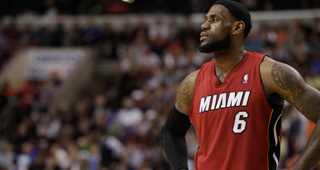MVP: LeBron James, Miami
Last season, I thought Dwight Howard, Derrick Rose and Dirk Nowitzki were the league’s three more valuable players. This year, Howard repeatedly wavered back and forth on trade demands before being sidelined after back surgery, Rose missed almost two months to injury and Nowitzki showed up out of shape before taking time off to improve his conditioning.
With none of the top teams this season similarly dependent on one player, the MVP award should go to LeBron, the best player in the NBA by a significant margin. There are no holes in his game: he’s a 6’9, 275 monster who averages 27 points on 53% shooting, defends all five positions and has 6.3 assists on 3.4 turnovers. It’s rather preposterous how good he is.
DPOY: Tyson Chandler, New York
Two years ago, no one would have thought it possible for Chandler to swing the balance of power in the NBA, but that’s exactly what happened this offseason. Without Chandler, the Mavericks forfeited any chance to defend their 2011 title, while his defensive presence was glue that held the Knicks wild season together. A 7’1, 240 jumping-jack who can play excellent individual defense on any big man, he also averages 10.8 rebounds, 1.6 blocks and 1.0 steals for a New York team that plays very little defense without him.
ROY: Kyrie Irving, Cleveland
With the lockout creating a relatively weak draft class this year, Irving was the easy choice. The 6’3, 190 point guard from Duke showed franchise player potential, averaging 18.6 points, 3.9 rebounds and 5.6 assists on 46.5% shooting. The 2012 lottery, which will be Cleveland’s best chance to pair Irving with another elite talent, looms large.
SIXTH MAN: James Harden, Oklahoma City
Another easy choice, with Harden emerging as the best under-30 shooting guard in the NBA this season. A complete 6’5, 220 guard, Harden averages 16.9 points, 4.1 rebounds and 3.7 assists on 49% shooting while handling almost all of the playmaking on Oklahoma City’s second unit after Eric Maynor’s season-ending injury. For the Thunder, the biggest concern is whether they’ll be able to afford him once he hits restricted free agency.
MIP: Jeremy Lin, New York
While some may question whether Lin just needed an opportunity to emerge as a legitimate NBA starter, his per-36 minute averages show how much he improved in Mike D’Antoni’s system. He went from 9.6 points and 5.3 assists on 39% shooting as a rookie to 19.6 points and 8.3 assists on 46% shooting this season. He’s the rare NBA player who transcends the sport and there’s no reason not to recognize that.
COACH: Doc Rivers, Boston
The most important part of an NBA coaches job is playing the matchups and identifying the best lineups on his roster. Rivers changed the dynamic of Boston’s season by inserting second-year guard Avery Bradley into the starting line-up and moving Ray Allen to the bench. The Celtics are now 19-8 with him as a starter and 18-19 without him. Rivers didn’t just recognize the correct move; he also had the credibility in the Boston locker room to convince Allen to take a step back.
EXEC: Kevin O’Connor, Utah
In a season where rampant tanking became one of the biggest storylines, O’Connor pulled off the impossible: rebuilding his team with two top-3 picks while remaining a playoff contender. The executive of the year is often a backwards-looking award, as the architects of top teams are rewarded for the pivotal decisions they made years earlier. Over the next few seasons, don’t be surprised if the Utah Jazz emerge as a contender in the Western Conference.

Jonathan Tjarks wrote on the NBA for RealGM from 2011-2016 before joining The Ringer.
Follow @JonathanTjarks on Twitter.


